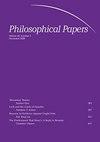道德责任与性格形成
IF 1.3
3区 哲学
0 PHILOSOPHY
引用次数: 0
摘要
自由决定论相容论认为,当且仅当行为源于一个坏性格时,行为才应该受到正确的谴责,而不管是什么导致了这个坏性格。从相关的意义上说,执行者本可以在拥有更好的角色时采取其他行动。但常识认为,不可避免的早期虐待经历至少可以减轻指责。和解是,当一个部分形成的坏性格导致早期的选择产生了一个更完全形成的性格,导致随后的错误行为时,对他们的指责就会因此而增加,但如果早期的野蛮行为是不可避免的,就不会因此而增加。正确地看,这种情况不是减轻了罪责,而只是加重了罪责。本文章由计算机程序翻译,如有差异,请以英文原文为准。
Moral Responsibility and Character Formation
Abstract Freedom-determinism compatibilism says a deed is correctly censurable if and only if it flows from a bad character, irrespective of what caused that character. In the relevant sense, the doer could have done otherwise whenever with a better character s/he would have. But commonsense considers that unavoidable early brutalizing experiences can at least mitigate blame. The reconciliation is that when a partly formed bad character causes early choices productive of a more fully formed character which leads then to subsequent misdeeds, blame for them is augmented on account of that, but it is not thus augmented if the early brutalization was instead unavoidable. Properly viewed, the case is one, not of reduced blame, but just of unaugmented blame.
求助全文
通过发布文献求助,成功后即可免费获取论文全文。
去求助
来源期刊

Philosophical Papers
PHILOSOPHY-
CiteScore
2.10
自引率
0.00%
发文量
18
期刊介绍:
Philosophical Papers is an international, generalist journal of philosophy edited in South Africa Original Articles: Articles appearing in regular issues are original, high-quality, and stand-alone, and are written for the general professional philosopher. Submissions are welcome in any area of philosophy and undergo a process of peer review based on initial editor screening and refereeing by (usually) two referees. Special Issues: Topic-based special issues are comprised of both invited and submitted papers selected by guest editors. Recent special issues have included ''Philosophy''s Therapeutic Potential'' (2014, editor Dylan Futter); ''Aging and the Elderly'' (2012, editors Tom Martin and Samantha Vice); ''The Problem of the Criterion'' (2011, editor Mark Nelson); ''Retributive Emotions'' (2010, editor Lucy Allais); ‘Rape and its Meaning/s’ (2009, editor Louise du Toit). Calls for papers for upcoming special issues can be found here. Ideas for future special issues are welcome.
 求助内容:
求助内容: 应助结果提醒方式:
应助结果提醒方式:


